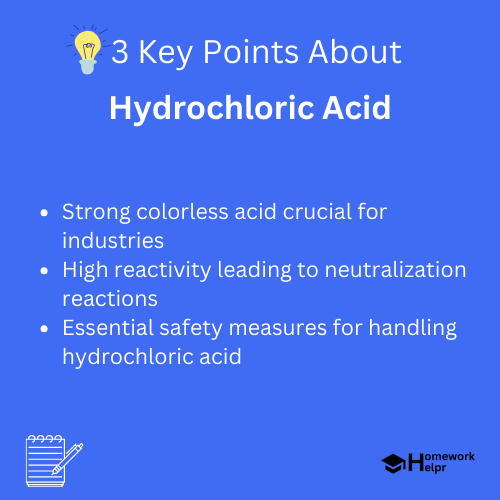📝 Summary
Hydrochloric acid, represented as HCl, is a strong and colorless acid essential in various industrial and laboratory processes. It is a solution of hydrogen chloride in water, known for its reactivity in neutralization reactions, and is highly soluble in water. Its corrosive nature poses risks, necessitating strict safety measures when handled. Hydrochloric acid finds applications in industrial processing, metal cleaning, the food industry, and as laboratory reagents. Understanding its properties, uses, and proper disposal is crucial for safety and environmental protection.
Understanding Hydrochloric Acid
Hydrochloric acid, often represented by the chemical formula HCl, is a strong and colorless acid. It plays an essential role in various industrial and laboratory processes. In this article, we will explore what hydrochloric acid is, its properties, uses, safety measures, and more.
What is Hydrochloric Acid?
Hydrochloric acid is a solution of hydrogen chloride in water. It is one of the simplest and most important acids in chemical processes. This compound is known for its high reactivity, especially with bases, which leads to neutralization reactions, forming salts and water.
Hydrochloric acid is highly soluble in water, and its presence is common in various household and industrial products. It is often used in cleaning agents, food processing, and the production of numerous chemicals.
Definition
Neutralization Reaction: A chemical reaction where an acid and a base react to produce salt and water.
Properties of Hydrochloric Acid
The physical and chemical properties of hydrochloric acid make it unique. Here are some of the notable properties:
- Strong Acid: Hydrochloric acid is classified as a strong acid, meaning it completely dissociates in water.
- Corrosive Nature: It can corrode metals and damage living tissues. Caution must be exercised when handling it.
- boiling Point: The boiling point of hydrochloric acid is approximately 110 °C (230 °F).
- pH Level: Its pH can be as low as 0, indicating its strong acidity.
Due to these properties, hydrochloric acid is utilized widely in various sectors, including industry and laboratory.
❓Did You Know?
Did you know that your stomach contains hydrochloric acid? It helps digest food and fight off harmful bacteria!
Uses of Hydrochloric Acid
Hydrochloric acid has a multitude of uses across different industries. Here are some of the primary applications:
- Industrial Processing: It is used in the production of various chemicals, including chlorine, fertilizers, and dyes.
- Metal Processing: Hydrochloric acid is beneficial in metal cleaning and pickling processes, where it removes rust and scales from metal surfaces.
- Food Industry: In small quantities, it is utilized for food processing, particularly in the production of gelatin and as a pH regulator.
- Laboratory Reagents: It serves as a reagent in chemical laboratories and analytical chemistry.
Examples
For instance, in the food industry, hydrochloric acid is used in the gelatin production process by breaking down proteins into smaller peptides, enhancing the gelling properties of the final product.
Safety Measures When Handling Hydrochloric Acid
Due to its corrosive nature and harmful effects, handling hydrochloric acid requires strict safety measures:
- Personal Protective Equipment (PPE): Always wear gloves, goggles, and protective clothing to prevent skin contact.
- Proper Storage: Store hydrochloric acid in a cool, dry place, away from incompatible materials such as bases and metals.
- Ventilation: Ensure proper ventilation when using hydrochloric acid to avoid inhaling its fumes.
- Spill Response: Have spill kits readily available and know the procedure to neutralize spills with appropriate materials.
Examples
If a spill occurs, use sodium bicarbonate (baking soda) to neutralize the acid safely before cleaning it up.
Environmental Impact of Hydrochloric Acid
Like many chemicals, hydrochloric acid can have a significant impact on the environment if not handled correctly. Its improper disposal can lead to soil and water pollution. Consequently, understanding proper waste management practices is crucial.
To mitigate environmental damage, it is essential to:
- Neutralize: Always neutralize hydrochloric acid before disposal, using appropriate neutralizing agents.
- Dispose: Dispose of residues in compliance with local regulations.
- Educate: Promote awareness of chemical handling and disposal among students and professionals.
Definition
Pollution: The introduction of harmful substances or products into the environment, causing adverse effects.
Conclusion
Hydrochloric acid is a vital chemical substance with a plethora of applications in various fields. Although it has significant uses, the dangers associated with its handling cannot be overlooked. Implementing safety measures and proper disposal practices is essential for anyone working with hydrochloric acid.
In summary, understanding hydrochloric acid’s properties, uses, and safety measures is crucial for effectively and responsibly managing this important chemical. Always prioritize safety and environmental health in your scientific explorations!

Related Questions on Hydrochloric Acid
What is hydrochloric acid’s chemical formula?
Answer: The chemical formula is HCl.
What industries use hydrochloric acid?
Answer: It is used in food, metal processing, and chemical manufacturing.
What safety measures are important for handling HCl?
Answer: Wear PPE, ensure ventilation, and know spill response.
How should hydrochloric acid be disposed of?
Answer: Neutralize before disposal and follow local regulations.
